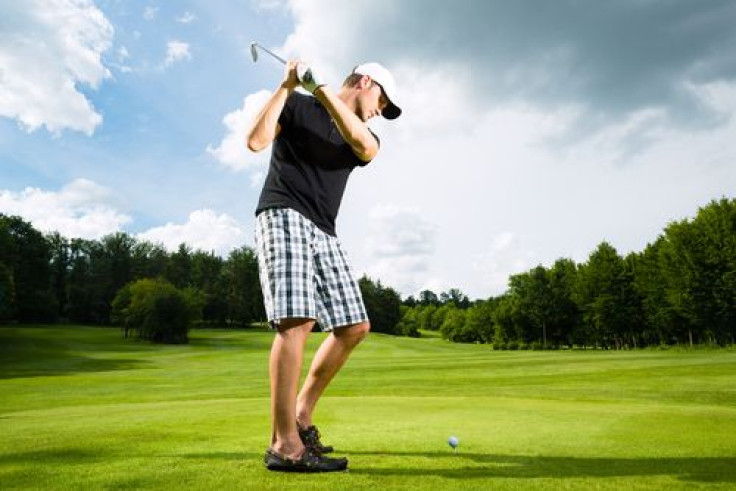Improve Your Golf Score By Treating Your Sleep Apnea: 6 Months of CPAP Therapy Lowers Golf Handicap By 31%

Whether it’s a new set of irons or golfs balls to get greater distance, an expensive driver, or a new putter, golfers are always looking for ways to improve their game. But simply getting more oxygen at night may be yet another way golfers can improve their score. A six-month continuous positive airway pressure (CPAP) treatment is found to lower golf handicap by 31 percent in golfers with obstructive sleep apnea (OSA), according to a recent study.
OSA is a sleep disorder where a person experiences temporary pauses in breathing during their sleep, which leads to disrupted sleep and daytime fatigue. The American Sleep Apnea Association says breathing becomes frequently interrupted or becomes very shallow during sleep resulting in pauses that commonly last between 10 to 20 seconds occurring multiple times at night. Patients with sleep apnea are susceptible to serious health problems over time such as diabetes, high blood pressure, heart disease, stroke, and weight gain.
Treatment for OSA, known as CPAP, consists of a patient wearing a face or nasal mask during sleep to provide a positive flow of air into the nasal passages to keep the airway open. The increased air pressure works to prevent the sleeper’s airway from collapsing. CPAP therapy not only helps reduce daytime sleepiness; it can also sharpen a patient’s cognitive function such as vigilance, attention span, and memory. Researchers now find CPAP’s enhancement of these cognitive skills can also help OSA golfers improve their handicap index through a six-month therapy program.
Published in the Journal of Clinical Sleep Medicine, a team of researchers evaluated the impact of CPAP therapy on the handicap index of golfers diagnosed with OSA syndrome over a period of six months. Forty-one people were recruited to complete consent forms of which only 24 met the criteria to participate in the study. The small cohort in the study consisted of all males with an average age of 55. The 24 golfers were placed into two groups: 12 OSA golfers were a part of the experiment group and 12 non-OSA golfers were a part of the control group.
All of the study participants maintained a handicap with the Golf Handicap and Information Network, part of the U.S. Golf Association (USGA), to keep things honest in regard to golf score. In golf, a handicap is defined as the average number of strokes shot over or under par, over a period of time, says the USGA. The handicap index is used as a reference of a golfer’s skill level where the lower the handicap, the better the player’s golf score.
The researchers recorded the golfers’ handicap indexes at the beginning of the study and at the end of the study, which was calculated after playing 20 rounds of golf. The golfers in the control group started with an average handicap of 12.2, and by the end had a 12.6 average. The OSA golfers treated for sleep apnea improved from an average of 12.4 to 11.0 by the end of the six-month CPAP treatment. On average, the treatment group utilized CPAP therapy for 6.3 hours per night for 91.4 percent of the nights, which is a high compliance rate in comparison to typical OSA patients.
While the average handicap index showed a small but significant improvement, the researchers found the most skilled golfers — those with a handicap of 12 or less at the start of the study — yielded the best results. The most skilled players in the control group started with a handicap of 8.4 at the start and fell down to 9.2 at the end of the study. However, the best players in the OSA treatment group moved from an average of 9.2 to 6.3 after the six-month treatment, overall a 31.5 percent improvement. The researchers found the biggest improvements in the lower handicap occurred in older golfers.
“We know that the cognitive parameters — vigilance, attention span, memory — people with sleep apnea do poorly on these tests and improve with treatment,” said Dr. Marc L. Benton, lead author of the study and medical director of the Sleepwell Center of New Jersey, The New York Times reports.
Golf is a cognitive game that requires the skills that sleep apnea treatment aims to improve in patients. Skills such as memory, decision making, anger management, calculation, and hand-eye coordination are enhanced for OSA patients. These cognitive parameters are essential elements that can positively affect a person’s golf game. When a golfer’s ability to think clearly or make good decisions is affected, their overall performance is more likely to suffer and affect their handicap index.
“With the cognitive enhancement afforded by successful treatment of their sleep apnea, they saw measurable improvement early and more significantly than those who were less skilled," said Breton in a press release.
The OSA golfers in the study were more inclined to follow up with CPAP therapy because they knew the treatment may improve their golf performance. Typically, patients with OSA are hesitant to undergo treatment because they express uneasiness in wearing equipment such as face masks every night, according to The Times. Compliance among OSA patients to wear night equipment has become a difficult challenge for doctors with only 40 to 70 percent of patients reporting use.
Approximately 22 million Americans suffer from sleep apnea, with 80 percent of the cases of moderate and severe sleep apnea going undiagnosed, says the American Academy of Sleep Medicine. OSA can affect people of any age, including infants and children, but it is more commonly seen in men over 40, especially in those who are overweight or obese.
To learn more about sleep apnea, click here.
Source: Benton ML, Friedman NS. Treatment of obstructive sleep apnea syndrome with nasal positive airway pressure improves golf performance. J Clin Sleep Med. 2013.



























